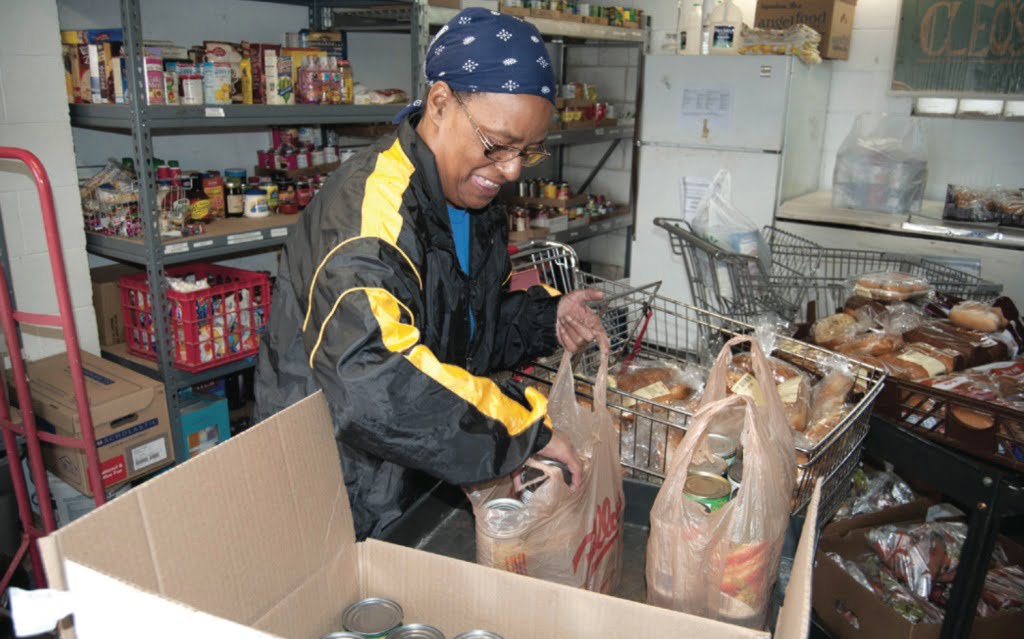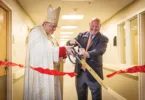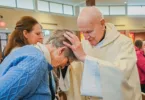
Volunteer Gretta Burnnett sorts donated food in the ministry’s food pantry. Each food pack has eight to 10 varieties of nonperishable food. The ministry also has a mobile pantry to reach those unable to travel.
by Joe Bollig
joe.bollig@theleaven.org
WAMEGO — You might think that this picturesque Flint Hills town, with its antique limestone storefronts and small-town charm, doesn’t have “big city” problems like poverty and homelessness.
And you would be wrong. People can fall through the cracks even in a town of fewer than 5,000 people.
Deb Kiker and other members of the Community Health Ministry in Wamego recently shocked members of the Chamber of Commerce — many of whom grew up in the town — with this reality check.
“In Wichita, I could take you to the parks and the places downtown where the homeless hang out,” said Kiker, a registered nurse and chief operating officer of the ministry.
Not so in Wamego.
“A year ago, we served 76 homeless clients,” said Kiker. “When we gave that number at a chamber meeting, they looked at us like we had three eyes and horns.”
The poor and homeless of Wamego are hidden. They “couch surf” in the winter, if they can find a welcoming home, and camp at county lakes in the summer. These are the struggling, working poor, the destitute young families, the sick and forgotten elderly, and those who’ve been set upon by an act of cruel fate — such as a sudden illness, injury or accident.
“You have homeless in Wamego?” a volunteer nurse incredulously asked Kiker a couple of weeks ago.
“Yup, yup we do,” replied Kiker, a member of the First Baptist Church of Wamego.
But since 2001, when Community Health Ministry was founded by Rosemary Helm, Lorena Carlson and Elizabeth Hesse (now deceased), the homeless — and all who struggle for access to quality health care — have found help.
Carlson, a member of St. Bernard Parish in Wamego, remembered how they helped a family soon after the ministry’s founding.
“A minister called us about a young family with a lot of kids, and they were beyond his capability to help,” said Carlson, a retired teacher. “They had a goat in their house, and their kids didn’t have shoes. The house was heated with a wood stove.”
The ministry helped them with utilities assistance, food, furniture and clothes. One young boy became very excited about a pair of red tennis shoes.
“He took that pair of red shoes out of that bag and put them on,” said Helms, a retired nurse and member of St. Joseph Parish in Flush. “They were much too big, so when we got ready to leave we said, ‘Why don’t you take a different pair of shoes that fit?’ And he said, ‘Oh no, these are my red Christmas shoes.’”
Born out of needs
Community Health Ministry started out with high ideals and no resources, so quixotic in nature that the founders might as well have jousted with the historic windmill in town.
Helms, Hesse and Carlson were retiring from their respective careers and they wanted to do something for their community.
They began at absolute zero: no building, no money, no material goods of any kind — nothing. In the beginning, they worked out of the back seats of their cars.
At first, they thought they’d focus on the neglected elderly, said Carlson. After talking with the Kansas Department of Social and Rehabilitation Services and other social service entities, including the now-defunct Wamego-based Reach Out, they discovered the need was greater than they knew.
“We started going around to the 64 churches [in Pottawatomie and Wabaunsee counties], and met with the pastors and church councils, or boards, or elders,” said Carlson.
“We told them what our goal was and they got behind us,” she continued. “We started out with parish nursing because Rosemary [Helms] is a registered nurse.”
The ministry began to take off when it got support from the churches. The First Presbyterian Church of Wamego donated a century-old house it had been using as offices. Today, about 40 of the two counties’ churches give support of one kind or another.
The ministry began to attract volunteers, too. Now the ministry has five doctors, a nurse practitioner, two dentists, and 118 other volunteers.
Other staff members include five nurses (two full time, two part time and one volunteer) and a number of compensated part-time employees.
Kiker remembers how she was recruited by Helms.
“Rosemary said to me, ‘You need to come, you need to come,’” said Kiker.
“Finally, I decided I needed to meet with her and tell her why I couldn’t do it,” she continued. “I came prepared with a list of eight reasons. She took the list and crossed every one of them out, and said, ‘So, when do you want to start?’”
Peeling the onion
The ministry is one of 40 “safety net” clinics in Kansas, but it offers social as well as health care services.
“We feel that, in order for people to remain healthy, they need to have all this other care,” said Carla Malone, an assistant office manager and member of the First United Methodist Church of Wamego.
The ministry offers the most comprehensive services of all the safety net clinics in Kansas, said Kiker. Two things that make this possible are the intake process and the handoff process.
Often a person will come for the lowest level of service, such as a box of food from the pantry. But during the intake process, that individual is asked all sorts of questions. Usually, a number of needs are uncovered. Kiker likens it to peeling an onion, exposing layer after layer of need.
The handoff is also critical. In Wamego, all the services are located in one building. In larger social service entities, the various services are parceled out to other locations and times, and this discourages clients.
“Our doctors,” said Kiker, “can stick their head out the door and say, ‘When I’m done, she needs to see a counselor; her electricity has been shut off and she’s running low on propane. She needs food and medicine.’”
“When she’s finished, the propane truck is on the way, arrangements have been made to turn on the electricity, the food box is ready, the medications are ready at the pharmacy, and the counselor’s at the end of the hall waiting for her,” said Kiker. “We take care of the whole person.”
Keeping collaboration close is beneficial in many ways. When the ministry switched its lab and X-ray work from a Junction City lab to the Wamego Community Hospital, patient lab compliance went from 17 to 100 percent.
Everyone is helped in some way, and no one is turned away, unless their own personal choices make it impossible for the ministry to help them. At the very least, each client that walks through their doors receives food, a sleeping bag and prayers.
Growing to meet need
The number of persons served last year was down slightly for budgetary, weather and staff reasons.
Demand, however, remains strong and the long-term trend is ever upward. For example, in counseling alone, the increase was from 75 clients in 2008 to 600 in 2011. For all services in 2011, the ministry served 5,831 clients who made 10,566 visits, or 1.8 visits per patient.
And the ministry reaches way beyond Pottawatomie and Wabaunsee counties. Most clients are from the two counties, but they’ve also seen individuals from 35 other counties and three other states. The ministry has even sent dressings to a leper colony in India, prosthetic legs to Africa, and medical supplies to the PRAY mission in Brazil’s Amazon region.
One of the remarkable things is how much the ministry does with the resources it has, including its “elderly” headquarters.
The century-old dwelling that houses the ministry in Wamego is only 1,000 cramped and inadequate square feet. Privacy is difficult because the two medical clinic exam rooms are only separated by an accordion-style divider. Rosemary Helms’ office is a cramped former bathroom on the second floor; her little desk sits over the capped-off pipes where the toilet once stood.
“There’s a group of people in town I always tell, ‘I need a building; make it happen,’” said Kiker. “In January, [Richard Weixelman] walked in and I said, ‘Hey Richard, I haven’t seen you in a long time. I need a building, and you’re the one who’s going to make it happen.’”
Kiker didn’t know that Weixelman just closed on the perfect building. The next week, he called Kiker and offered five offices on the front, but Kiker said she wanted the whole 4,600-square-foot structure.
He protested that he had plans for most of the building but, after talking to his wife Theresa, Weixelman offered the offices, warehouse and a large open area. The ministry is planning a capital campaign to raise funds to purchase the building.
The ministry is also expanding to nearby communities. Satellite offices have been established to the west in St. George and to the south in Alma.
The Alma office is housed in the former Holy Family Parish rectory, a large two-story house. The parish retains ownership, but has allowed the ministry to use the space since last November.
This site offers case management, rent and utility assistance, a food pantry, clothes, dental care, household items, counseling and prescription assistance.
What services each of the clinics will offer in the future is unknown.
“Like I told the parish council [in Alma], what we’ll become is what is needed, just like in Wamego,” said Malone, who manages the Alma site.
As they have since the beginning, the ministry’s volunteers will look for the “holes” where the poor of the community are falling through. They’re not only confident that God will guide, but also supply.
“God’s in the supply business,” said Kiker. “We’re simply distributors.”







